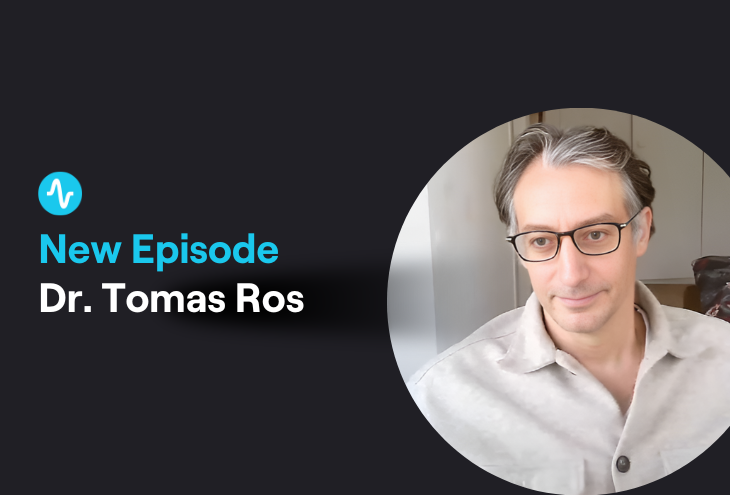Neurofeedback and EEG diagnostic microstates for ADHD, PTSD and Schizophrenia with Dr. Tomas Ros
August 26, 2024 - neurocare group

In a recent interview, Dr. Tomas Ros, a neuroscientist and EEG researcher at the Center for Biomedical Imaging, University of Geneva, Switzerland, shared groundbreaking insights into the use of neurofeedback and EEG microstates in diagnosing and treating various mental health disorders. The conversation with neurocare academy's Dr. Trevor Brown covered the application of neurofeedback for PTSD, the importance of personalized protocols for ADHD, and the diagnostic power of EEG microstates for ADHD, PTSD, and schizophrenia.
Watch the interview here and subscribe to our YouTube channel!
Personalizing Neurofeedback Protocols for ADHD
Dr. Ros highlighted the evolving nature of neurofeedback in the treatment of ADHD. Traditional approaches often fall short due to the heterogeneous nature of ADHD, where different individuals exhibit diverse brain activity patterns. Tomas emphasized the need for personalized neurofeedback protocols tailored to specific brain biomarkers. His research is shedding light on the potential of using EEG microstates—brief periods of stable brain activity—as a method to fine-tune these protocols. By processing the fast-changing brain dynamics captured in EEG microstates, clinicians can develop more flexible and personalized neurofeedback treatments for ADHD, potentially improving clinical outcomes significantly.
Neurofeedback's Promising Results for PTSD
The discussion also touched on the application of neurofeedback for treating PTSD. Dr. Ros's team has been pioneering this approach, yielding very promising results. Neurofeedback for PTSD involves training patients to alter their brain wave patterns, particularly focusing on increasing the alpha frequency associated with relaxation and reducing hypervigilance. Dr. Ros explained that PTSD patients often exhibit insufficient alpha activity, which is linked to difficulty in relaxation and persistent hypervigilance. By restoring alpha rhythm through neurofeedback, patients can experience significant symptom relief. While these findings are encouraging, Tomas mentioned that neurofeedback for PTSD is very close to accumulating enough research for it to be implemented in clinical settings.
EEG Microstates as Diagnostic Tools
One of the most compelling points of the interview was the discussion on EEG microstates and their diagnostic potential for mental disorders such as ADHD, PTSD, and schizophrenia. Dr. Ros's research indicates that specific EEG microstates can provide vital information about these conditions, offering new avenues for diagnosis and treatment personalization. For instance, particular microstate patterns have been associated with ADHD, providing a more nuanced understanding of the disorder's electrophysiological underpinnings. Similarly, distinct microstate configurations have been linked to PTSD and schizophrenia, aiding in more accurate diagnosis and targeted treatment approaches.
The Future of Neurofeedback and EEG Research
Looking forward, Dr. Ros envisions a future where neurofeedback and EEG microstate analysis become integral parts of psychiatric and neurological care. Advances in technology, such as the development of more portable and user-friendly EEG devices, will facilitate larger-scale studies and broader clinical application. Additionally, integrating machine learning with EEG data analysis could enhance the precision and effectiveness of neurofeedback protocols, tailoring interventions to the individual needs of patients with ADHD, PTSD, and schizophrenia.
Dr. Tomas Ros's insights underscore the transformative potential of neurofeedback and EEG microstates in mental health care. By personalizing treatment protocols and leveraging the diagnostic power of EEG microstates, clinicians can offer more effective and targeted interventions for disorders like ADHD, PTSD, and schizophrenia. As research and technology continue to advance, these innovative approaches promise to improve outcomes and quality of life for countless individuals affected by these conditions.
About the series:
The neurocare group is a global network of experts in neuroscience, psychology, and engineering, with a mission to empower best practices and bring innovative and sustainable mental health techniques to more patients in need through our network of clinics. Through this interview series, the head of the neurocare Academy, Dr Trevor Brown, interviews leading minds in this field, to present the state of research and possibilities and effective models of care in mental health and cognitive performance.
If you are a patient looking for more information about these techniques or to find one of our clinics worldwide, visit www.neurocaregroup.com/patients/
Are you a practitioner interested in learning how you can apply TMS and other neuromodulation techniques in your own practice?
Learn from the experts at neurocare Academy on our LMS (https://lms.neurocaregroup.com/) neurocare Academy also offers in-person training and supervision in workshops throughout the world.
For more information visit: www.neurocaregroup.com/academy/






